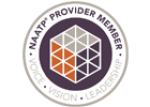Blog
SAMHSA Funding Increases Access to Opioid Addiction Treatment in NY
For decades, citizens in Oswego County have relied on addiction treatment programs provided by Harbor Lights Chemical Dependency Services located in Mexico, New York. This facility helped countless individuals struggling with opiate dependency by offering vital medication assisted treatment on an outpatient basis. As the facility prepared to close their doors in the beginning of 2021, it was obvious that the increasing demand for MAT in Northwestern New York would need to be met elsewhere.
The treatment center administrators made arrangements for existing patients and staff members to be relocated to Farnham Family Services, an outpatient opioid MAT provider with offices in Oswego and Fulton, New York. As the isolation related to COVID 19 shut downs stoked substance use disorder in the area though, addiction treatment professionals recognized the need for greater access to professional treatment.
The first wave of financial support came from the non-profit Shineman foundation in the form of a $130,000 grant in early 2021. The Federal Substance Abuse and Mental Health Services Administration (SAMHSA) soon followed up with a grant of their own that would contribute $525,000 per year to Farnham Family Services to expand their operations and increase accessibility to medication-assisted treatment for opiate addiction. This grant will continue funding for the next 5 years.
The grant is intended to continue to provide MAT services in Oswego county, and also expand into Cayuga County (through collaboration with the Confidential Help for Drugs and Alcohol Center in Auburn. Prior to this expansion, patients in Auburn had to travel to Syracuse or Ithaca to receive substance abuse treatment.
According to the National Center for Health Statistics, there were more than 100,000 fatal overdoses in America between April 2020 and April 2021. This represents an increase of almost 30% compared to the prior year. The numbers are even more staggering when compared to just 5 years earlier. Since 2015, overdose deaths across the country have more than doubled.
Opioid treatment programs (OTP) provide FDA approved medications like Suboxone (also sold under other brand names like Sublocade, Subutex, and Zubsolv) which combine buprenorphine and naloxone. These medications work by reducing cravings, eliminating withdrawal symptoms, and blocking the effect of opioid drugs including heroin and fentanyl. This blocking effect of MAT for opiate dependence reduces the likelihood of relapse and lowers the chance of overdose if an individual does relapse.
Other treatments for opioid use disorder include methadone maintenance. However, due to strict regulations in the United States patients receiving methadone to treat opioid use disorders are required to go to the clinic to receive their medication every day. Buprenorphine based medications can be picked up at the pharmacy like any other prescription.
While this increased access to medication assisted treatment (MAT) will unquestionably help in the fight against opioid addiction, it is important to consider that counseling and behavioral therapies should always be combined with these treatment options. Health care that neglects the psychological and emotional components and try to just treat substance use disorders are unlikely to produce long-term sobriety.
Medication Assisted Treatment For New York Residents at All In Solutions
For individuals seeking treatment of opioid dependence, All In Solutions Counseling Center Cherry Hill offers medication-assisted treatment programs and behavioral health addiction treatment to clients in the tri-state area. Clients enrolled in the inpatient or outpatient drug rehab can attend treatment from the comfort of a structured sober living environment that is near the facility. All In Solutions offers programs for individuals struggling with addiction to prescription opioids and heroin, as well as other drugs and alcohol use disorder.
For more information about All In Solutions’ New Jersey addiction treatment program, contact the admissions department today.




